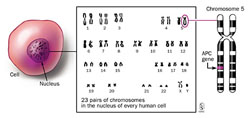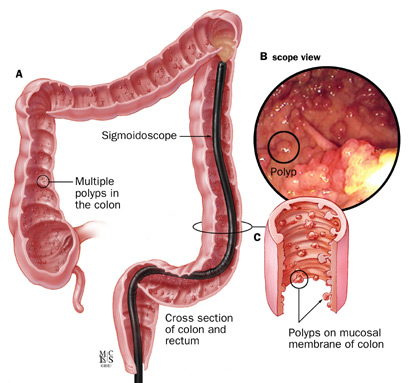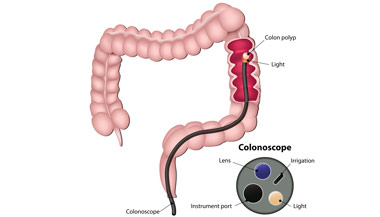Familial Adenomatous Polyposis
Familial adenomatous polyposis (FAP) is an inherited condition that affects the gastrointestinal tract. FAP leads to hundreds or thousands or polyps inside the colon or rectum.
(hereditary polyposis of the colorectum, familial polyposis, Gardner's syndrome)

Familial Adenomatous Polyposis Symptoms
Many patients with colorectal cancer experience no symptoms in the early stages of the disease. Symptoms may not appear until the disease is in an advanced stage. Routine colorectal screening and understanding the risk factors are important.
Symptoms of colorectal cancer are similar to symptoms of other colon diseases. If you experience the following symptoms, make an appointment with a Johns Hopkins gastroenterologist who can accurately diagnose your condition.
-
Bloody stool
-
Unexplained diarrhea
-
A long period of constipation
-
Abdominal cramps
-
Decrease in size or caliber of stool
-
Gas pain, bloating, fullness
-
Unexplained weight loss
-
Lethargy and vomiting
Abnormalities in other areas of your body may indicate the presence of FAP. These abnormalities include:
-
Bumps or lumps on bones of legs, arms, skull and jaw
-
Cysts of the skin
-
Teeth that do not erupt from the gums when they should
-
Freckle-like spots on the inside lining of the eyes
Familial Adenomatous Polyposis Diagnosis
Genetic testing is available for FAP as well as other hereditary colorectal conditions. A simple blood test can determine if you have the gene mutation that causes the disease in about 80 percent of families with FAP.
Your doctor will keep a detailed medical history about you, including your personal and family medical histories. He or she will perform a physical examination and may order laboratory tests. Other diagnostic procedures include:
-
Digital Rectal Exam
-
Fecal Occult Blood Test
-
Flexible Sigmoidoscopy
-
Colonoscopy
-
Barium Enema
Digital Rectal Exam
Your doctor may perform a digital rectal examination, a painless examination of your rectal area. Your doctor inserts a gloved, lubricated finger into the rectum to gently feel for any abnormalities.
Fecal Occult Blood Test
This test looks for occult (hidden) blood in the stool. For this test:
-
You receive three small cards and place a sample on each from three consecutive bowel movements.
-
A small amount of the stool is placed on a special test strip.
-
The stool is analyzed to see if there is any blood.
Flexible Sigmoidoscopy
A flexible sigmoidoscopy is a type of endoscopic diagnosis. An endoscope is a thin, flexible lighted tube that your doctor inserts inside you to see the area.
A flexible sigmoidoscopy examines the rectum and lower colon. During the procedure:
-
Your colon must be clear of stool so your doctor has good visibility. Preparations may include a liquid diet, enema and laxatives.
-
A sigmoidoscope is inserted through the rectum and into the anus and large intestine.
-
The doctor checks to see if cancer or polyps are present.
-
A biopsy forceps may be inserted through the scope in order to remove a small sample of tissue for further analysis.
-
The procedure may cause some cramping or discomfort.
Colonoscopy
A colonoscopy is the best way to detect polyps or cancer. A colonoscopy allows for further visualization into the bowel than the sigmoidoscopy, and determines if polyps or cancer are present.
During a colonoscopy:
-
Your colon must be clear of stool so your doctor has good visibility. Preparations may include a liquid diet, enema and laxatives.
-
You are sedated before the procedure.
-
A colonoscope is inserted through the rectum and into the anus and large intestine.
-
The doctor checks to see if cancer or polyps are present.
-
Biopsy forceps may be inserted through the scope in order to remove a small sample of tissue for further analysis.
-
If there is a polyp, it can be removed through the colonoscope.
-
The procedure may cause some cramping or discomfort.
Barium Enema
A barium enema is an X-ray of the rectum and colon. Before the procedure, you will need to clear your colon of any stool. Preparations may include a liquid diet, enema or laxative. During a barium enema:
-
A barium preparation (contrast material) is inserted through a rectal tube.
-
The barium outlines the colon, highlighting any abnormalities.
-
An X-ray is taken.
-
Your doctor can see the entire colon and see if polyps or cancer are present.
Familial Adenomatous Polyposis in Children
Children with FAP develop hundreds to thousands of polyps throughout their colon at a young age, usually as a teenager or young adult. The polyps may become cancerous if untreated. However, FAP is very treatable and most kids with FAP lead normal, healthy lives.
Children who are considered at risk for developing colorectal cancer should be screened starting at 11 years of age. Waiting for symptoms to appear is not safe, as they may only appear once the disease is advanced.






